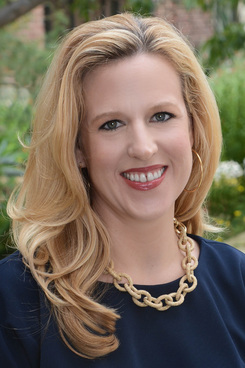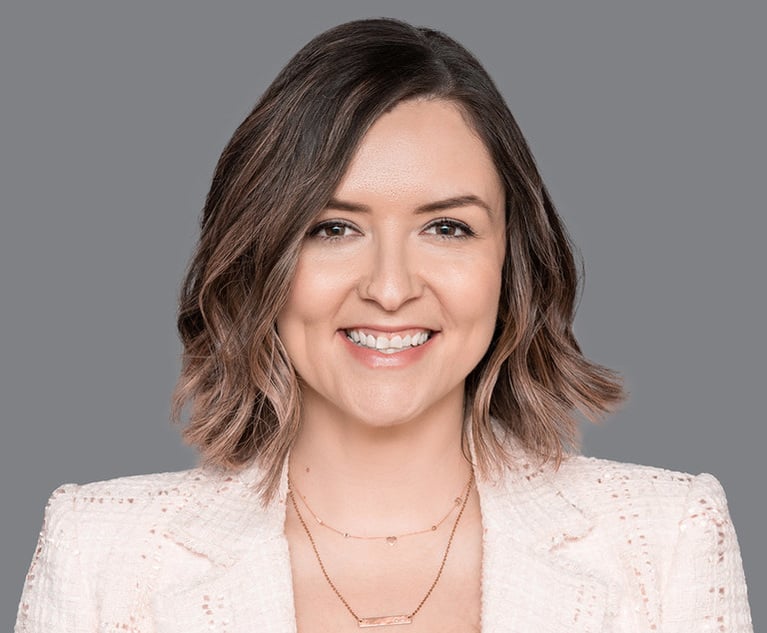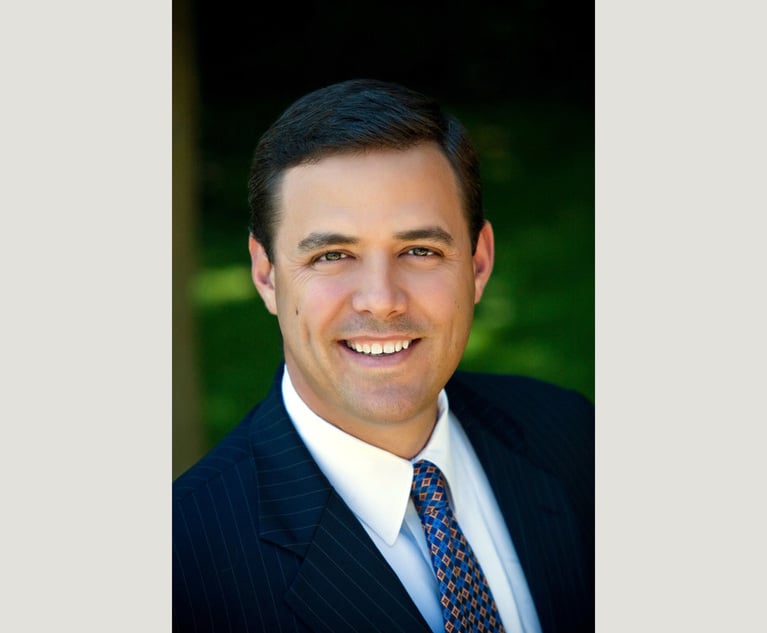Tobi Young, First Native American SCOTUS Clerk, Recounts Year With Gorsuch
"I think he is a worthy successor to Justice Scalia, perhaps the best wordsmith in Supreme Court history, and I have little doubt that Gorsuch opinions will proliferate in case books for the same reason Scalia opinions do," Tobi Young says in a wide-ranging Q&A.
May 15, 2020 at 01:56 PM
10 minute read
The original version of this story was published on National Law Journal
 U.S. Supreme Court building on April 23, 2019. Credit: Diego M. Radzinschi / ALM
U.S. Supreme Court building on April 23, 2019. Credit: Diego M. Radzinschi / ALM
Tobi Young made headlines in April 2018 as a historic first among law clerks at the U.S. Supreme Court.
Justice Neil Gorsuch hired Young, an Oklahoma-born citizen of the Chickasaw Nation, to be a clerk for him in the 2018-2019 term of the court. She was believed to be the first known enrolled citizen of a Native American tribe to serve as a law clerk at the high court.
 Tobi Young.
Tobi Young.Gorsuch knew Young from their days at the U.S. Justice Department in the early 2000s, when she was an honors attorney on detail as a counsel to the assistant attorney general for civil rights and he was principal deputy to the associate attorney general. She went on to work at the Bush White House counsel's office in 2007 and 2008 before becoming general counsel to both the Office of the Former President and the George W. Bush Presidential Center, eventually also becoming the board secretary. She left the Bush center to take on the clerkship.
In a 2019 Chickasaw TV conversation, Young recounted her first workday at the high court. "I had butterflies walking up to the building. It's grand. It's overwhelming, but you walk in and take a deep breath, and say, 'Here I go.'" Her fellow Gorsuch clerks were Ethan Davis, Paul Mezzina and Jeffrey Quilici.
As with most law clerks, Young has spoken little about her clerkship after she left the court in August 2019. She agreed to speak with ALM about that experience, as well as her new in-house job as vice president for government and legal affairs at Cognizant Technology Solutions Corp. The interview was edited for length.
How was your year at the Supreme Court in general?
Candidly, clerking was not in my life plan, especially not when I had a 2-year-old at home. But the invitation to work for Justice Gorsuch was too good an opportunity for any response other than, "Yes, thank you!" The year exceeded my expectations. I was older than the average law clerk, so was able to enjoy my role as "mama" to younger clerks around the building and loved learning from the many diverse perspectives and experiences that they brought. And within the Gorsuch chambers, my co-clerks will always be my band of brothers. Being part of the first female-majority law-clerk class was also a special privilege. The court photographer, Fred Schilling, captured our group photo for posterity. It will be a great story to share with my daughter one day, although I hope that by then her first reaction will be to wonder why it was a big deal.
What was it like working with Justice Gorsuch?
When I think of my year in the Gorsuch chambers, my mind quickly jumps to the spirited debate and the boisterous laughter that the justice led. The justice made us feel like a family and urged us to look out for one another. And he took family literally; my daughter often rode her tricycle into the office. And for me, a great capstone to the amazing year was traveling with the justice to my old stomping grounds at the George W. Bush Presidential Center when the justice asked me to join him for a podcast interview. He has a way of building up his clerks.
 Justice Neil Gorsuch walks down the steps of the U.S. Supreme Court after his Investiture ceremony June 15, 2017. Credit: Diego M. Radzinschi / ALM
Justice Neil Gorsuch walks down the steps of the U.S. Supreme Court after his Investiture ceremony June 15, 2017. Credit: Diego M. Radzinschi / ALMDo you think your unique status as a Native American brought a different perspective to the justices, some of whom have been criticized for not hiring diverse law clerks? Justice Sandra Day O'Connor has talked about the importance of storytelling within the court; did you tell stories about your family background?
It's funny you mention Justice O'Connor. The first time I went to the court was with a group of Chickasaw students during a summer in D.C. The justice's clerks gave us a tour and we were all surprised and impressed that her office was beautifully decorated with art and artifacts from the west and Indian Country. The enthusiasm she exhibited for native culture really struck me, and I've never forgotten it. And obviously, the fact that you and some others found my background to be noteworthy gave me an opportunity to share my story and the pride I have in the Chickasaw Nation. Far too few grow up familiar with Indian history and law. I enjoyed engaging on those topics.
Looking at me one wouldn't guess that my grandfather had been thrown out of a restaurant in Oklahoma for being Indian, but sharing such stories served as an ice breaker for learning about the unique experiences and stories of my colleagues. And we did throw a happy hour at the court catered by the Smithsonian's National Museum of the American Indian, which was a hit. Let me be clear, though. I don't think that our personal backgrounds should affect how we construe legal texts. The words of a statute mean what they mean.
But I strongly believe sharing experiences and perspectives helps build trust and a foundation for working together.
A year ago, you were probably in the midst of the May crunch, the time when decisions, concurrences and dissents have to be finished. Now, with the court postponing both the March and April arguments because of the pandemic, and arguments resuming in May, what do you think the clerks are doing with their time?
I've tried to put myself in the shoes of this year's clerks. I would not have enjoyed doing the work entirely remotely, never seeing my teammates and the justice and colleagues from other chambers. I bet most clerks willingly would have brought sleeping bags and quarantined at the court to preserve the unique experience and collaboration. Missing out on performing the ritual skit for the justices must be a lot like a high school senior missing prom! Yet the work must get done, and they're getting it done, as the release of opinions illustrates each week. Even with postponed arguments, the clerks likely remain quite busy. The work always expands to fill the time. I also think of Justice Gorsuch's stories from his clerk days and helping his boss with technology (the fax machine). I wonder if any of the justices are getting similar guidance from their clerks.
When you arrived at the court, there was a Twitter hashtag that highlighted Justice Gorsuch's sometimes unusual writing style. How did he react to that, and did his style change as the term went on?
Having been lucky enough to work with the justice I can tell you #REALgorsuchstyle is a lot of fun! Maybe we need a new hashtag—#GorsuchNYTBestseller. In all seriousness, Justice Gorsuch is a teacher at heart and getting to work with him was an incredible learning experience, and I came to appreciate the writer's craft even more than I did before. As the first lawyer in my family (not counting my husband Evan [Young, partner at Baker Botts], who is also the first lawyer in his family), what I appreciate about Justice Gorsuch's writing is its accessibility. As he frequently notes, litigants and citizens deserve to read a judge's work and understand what the law means, particularly how it impacts their rights and livelihood. I think he is a worthy successor to Justice [Antonin] Scalia, perhaps the best wordsmith in Supreme Court history, and I have little doubt that Gorsuch opinions will proliferate in case books for the same reason Scalia opinions do.
When your Supreme Court clerkship ended last August, I am sure you could have taken your pick of law firms to work for. Why did you go in-house instead?
My mind was wide open coming out of the clerkship. But when Wan Kim, my former boss and mentor at the Civil Rights Division of DOJ, brought up the possibility of joining him and Matt Friedrich in Cognizant's legal department, I was intrigued, and after I learned more, I was thrilled. Working in the technology sector appealed to me; tech law and policy really is the next frontier. Matt is the general counsel, and he's another Department of Justice alum that both my husband and I have known and admired for many years. I knew Matt's wife from the White House, and my husband Evan once had an office adjacent to Matt's at DOJ.
As I got to know the other leaders at Cognizant, including our CEO Brian Humphries, the fit became even clearer. Brian stressed how strongly the company values responsibly serving our clients to allow technology to meaningfully contribute to human lives. Cognizant backs this up in many ways—as just one example, it has invested $100 million in the Cognizant Foundation to support STEM education and skills training across the United States. I'm very excited to have been invited to join the Cognizant Foundation board. All of this is just to say that, in the end, I'm delighted that I followed the career advice I often give others: pick your people and the rest will fall into place. I couldn't ask for better leaders to work with and learn from than Brian, Matt and Wan.
Can you talk about your position at Cognizant—what the company does, what role you are playing, and how has the COVID-19 outbreak affected the company and your role?
I have a dual-hatted role at Cognizant. My title is "vice president of government affairs and legal," which means I get to stay engaged in the practice of law, while also focusing on policy at the federal and state levels. I would not have guessed I could find a position that hit the sweet spot of my legal, policy and communications background. I get asked frequently about the company.
Cognizant is a U.S.-based Fortune 200 professional services company that helps businesses adapt and exist in today's digital world by leveraging technologies like artificial intelligence, digital engineering, and the cloud. I've had a crash course during these unprecedented times, so to put it in terms of our current world, Cognizant is on the front lines of the COVID-19 health care response, supporting companies searching for a vaccine and helping make telehealth possible.
I'm very grateful during this time there are doctors, nurses, scientists and engineers in this world working around the clock to fight this pandemic. Lawyers don't have these awesome superpowers, but I am proud to say I work at a company where there are people who do.
Read more:
Justice Gorsuch Would Be 'Grateful' if You'd Answer His Question
Writing Styles of Gorsuch and Kavanaugh Revealed in Arbitration Rulings
From Law Prof to SCOTUS Clerk: Gorsuch Is Hiring From Academia
This content has been archived. It is available through our partners, LexisNexis® and Bloomberg Law.
To view this content, please continue to their sites.
Not a Lexis Subscriber?
Subscribe Now
Not a Bloomberg Law Subscriber?
Subscribe Now
NOT FOR REPRINT
© 2025 ALM Global, LLC, All Rights Reserved. Request academic re-use from www.copyright.com. All other uses, submit a request to [email protected]. For more information visit Asset & Logo Licensing.
You Might Like
View All
Quiet Retirement Meets Resounding Win: Quinn Emanuel Name Partner Kathleen Sullivan's Vimeo Victory

How I Made Partner: 'Your Coworkers Are One of the Most Valuable Assets You Have,' Says Laurel Roglen of Ballard Spahr

Can a Law Firm Institutionalize Its Culture? Boies Schiller’s New Chairman Will Try

How I Made Office Managing Partner: 'Stay Focused on Building Strong Relationships,' Says Joseph Yaffe of Skadden
Law Firms Mentioned
Trending Stories
- 1Silk Road Founder Ross Ulbricht Has New York Sentence Pardoned by Trump
- 2Settlement Allows Spouses of U.S. Citizens to Reopen Removal Proceedings
- 3CFPB Resolves Flurry of Enforcement Actions in Biden's Final Week
- 4Judge Orders SoCal Edison to Preserve Evidence Relating to Los Angeles Wildfires
- 5Legal Community Luminaries Honored at New York State Bar Association’s Annual Meeting
Who Got The Work
J. Brugh Lower of Gibbons has entered an appearance for industrial equipment supplier Devco Corporation in a pending trademark infringement lawsuit. The suit, accusing the defendant of selling knock-off Graco products, was filed Dec. 18 in New Jersey District Court by Rivkin Radler on behalf of Graco Inc. and Graco Minnesota. The case, assigned to U.S. District Judge Zahid N. Quraishi, is 3:24-cv-11294, Graco Inc. et al v. Devco Corporation.
Who Got The Work
Rebecca Maller-Stein and Kent A. Yalowitz of Arnold & Porter Kaye Scholer have entered their appearances for Hanaco Venture Capital and its executives, Lior Prosor and David Frankel, in a pending securities lawsuit. The action, filed on Dec. 24 in New York Southern District Court by Zell, Aron & Co. on behalf of Goldeneye Advisors, accuses the defendants of negligently and fraudulently managing the plaintiff's $1 million investment. The case, assigned to U.S. District Judge Vernon S. Broderick, is 1:24-cv-09918, Goldeneye Advisors, LLC v. Hanaco Venture Capital, Ltd. et al.
Who Got The Work
Attorneys from A&O Shearman has stepped in as defense counsel for Toronto-Dominion Bank and other defendants in a pending securities class action. The suit, filed Dec. 11 in New York Southern District Court by Bleichmar Fonti & Auld, accuses the defendants of concealing the bank's 'pervasive' deficiencies in regards to its compliance with the Bank Secrecy Act and the quality of its anti-money laundering controls. The case, assigned to U.S. District Judge Arun Subramanian, is 1:24-cv-09445, Gonzalez v. The Toronto-Dominion Bank et al.
Who Got The Work
Crown Castle International, a Pennsylvania company providing shared communications infrastructure, has turned to Luke D. Wolf of Gordon Rees Scully Mansukhani to fend off a pending breach-of-contract lawsuit. The court action, filed Nov. 25 in Michigan Eastern District Court by Hooper Hathaway PC on behalf of The Town Residences LLC, accuses Crown Castle of failing to transfer approximately $30,000 in utility payments from T-Mobile in breach of a roof-top lease and assignment agreement. The case, assigned to U.S. District Judge Susan K. Declercq, is 2:24-cv-13131, The Town Residences LLC v. T-Mobile US, Inc. et al.
Who Got The Work
Wilfred P. Coronato and Daniel M. Schwartz of McCarter & English have stepped in as defense counsel to Electrolux Home Products Inc. in a pending product liability lawsuit. The court action, filed Nov. 26 in New York Eastern District Court by Poulos Lopiccolo PC and Nagel Rice LLP on behalf of David Stern, alleges that the defendant's refrigerators’ drawers and shelving repeatedly break and fall apart within months after purchase. The case, assigned to U.S. District Judge Joan M. Azrack, is 2:24-cv-08204, Stern v. Electrolux Home Products, Inc.
Featured Firms
Law Offices of Gary Martin Hays & Associates, P.C.
(470) 294-1674
Law Offices of Mark E. Salomone
(857) 444-6468
Smith & Hassler
(713) 739-1250








